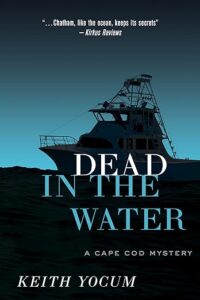Today, we’re talking with Keith Yocum, about his book Dead In The Water (A Cape Cod Mystery Book 2).
Tell us something unexpected about yourself!
In high school I represented Western Australia in the Australian Under-16 Rugby Union Tournament held in Tasmania. We got thoroughly trounced by the New South Wales teams, but we won the prize for brashness, mate.
Why do you write?
As a former journalist, I’ve been writing for a long time and love every part of it. Except the editing. And the re-writing. Every morning before I start composing, I hand-wind my Scottish-Australian grandfather’s 100-year-old pocket watch as a reminder of the wonderful people who’ve made my life so meaningful.
Where did you get the inspiration for your current book?
Cape Cod is a magnificent peninsula shaped like a bent elbow. It juts 30 miles into the Atlantic Ocean and is full of interesting people, places, and things. There are undercurrents of tension lurking below the surface here, and I enjoy poking and prodding the social and demographic terrain.
What do you enjoy the most about your genre?
Mysteries are endlessly fascinating, with layer upon layer of complexity, including the human tendency to do bad things.
How would you describe your writing process?
I typically start with an outline of the main plot points and let the story tell itself. Over the years, I’ve developed a bad habit of waking up in the wee hours and ruminating about a plot problem that needs to be resolved. This invariably leads to lost sleep and more plot problems that need more rumination to solve.
What do you think authors have to gain from participating in social media?
Readers have a desire to interact with authors. They’re curious about how authors develop stories and what their motivations are. This is healthy and a reasonable request. Many authors simply want to write and turn it over to the publisher to promote. Alas, those days are gone, and social media is a necessary part of an author’s platform.
What advice would you have for other writers?
If the goal for an author is simply to tell a story, then write what moves you. If the author wants to generate a larger cache of readers, they have to pay some attention to what moves the reader. It’s one way or the other.
How do you select your books’ titles and covers?
For covers, I usually send out three examples to my email list and ask for their advice. For titles, I work with my trusted adviser who is my wife and is never wrong on this subject.
What’s your next step?
I have two books mapped out and need to do a little more on-the-ground research. Then it’s back to pounding the keyboard and waking up in the middle of the night…
What book do you wish you had written?
All The Pretty Horses by Cormac McCarthy.
How do you react to seeing a new review for your book?
If it’s a good review, I’m pretty happy. If it’s a bad review, I try to decide if the criticism is valid. If it’s valid, I pay attention to its message. If it’s not valid, I move on. I’m still glad they gave my book a read.


